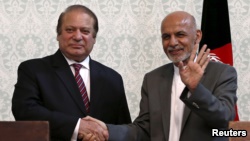By Muhammad Luqman
Afghan President Ashraf Ghani has said that Kabul has agreed with a proposal to conduct joint raids with neighbouring Pakistan along the border, monitored by the United States.
His statement came two weeks after Pakistan proposed joint border operations against illegal movements.
Ghani told the American senators’ delegation that visited Kabul after meeting with Pakistani leaders and policy makers in Islamabad this week.
According to the official statement issued by the Afghan Presidential Palace, the US delegation informed Afghan leadership about Pakistan’s pledges to cooperate for peace in Afghanistan.
“Afghanistan does not take American support for granted…US and Afghanistan had a relationship based on mutual interest and mutual respect. What was taking place was not a war in Afghanistan, but a war over Afghanistan against transnational terrorist organisations,” the statement quoted Ghani as saying.
“And there were questions now as to whether the Taliban was a criminal organisation with a political front rather than the other way round. Transnational crime and narcotics meant there had to be a regional solution.”
The statement added that the US delegation were in Afghanistan to review progress in the war-torn country.
According to the statement members of the delegation agreed that a regional solution was needed to end the violence in Afghanistan and the region at large. “The senators said the head of Pakistan’s armed forces, General Qamar Javed Bajwa, agreed to joint operations against terrorist groups in the border region. They said the US would provide monitoring and verification of these operations,” the statement said.
After the a string of meetings in Kabul, Senator McCain told reporters that the Unites States needs to have a new strategy to win in Afghanistan but that “the strongest nation on earth should be able to win this conflict.”
“The old effort certainly didn’t work,” McCain said at the press conference. “They (Taliban) are not going to negotiate unless they think they are losing,” he added. “So we need to win and have the advantage on the battlefield and then enter into a serious negotiation to resolve the conflict.”
Senator Lindsey Graham said he would tell President Trump after returning home that 8,600 American troops currently in Afghanistan “will not get the job done” and that more American troops along with more NATO troops should be deployed to “turn stalemate into success.”
According to Washington Post, the senators called for more aggressive American military action in Afghanistan, as well as pressure on neighbouring Pakistan, saying the United States needs “a winning strategy” to end the 16-year war here and prevent the spread of terrorism.
Graham also said that “throwing more bombs” is not enough, and that the Trump administration needs to put more effort into understanding and influencing regional leaders. “Rex Tillerson needs to come here quick,” he said, referring to the secretary of state, who has not yet visited the war-torn and insurgent-plagued region.
Despite the urgent tone of the senators’ remarks, McCain predicted that the conflict in Afghanistan would continue “on a low-burning simmer for a long time to come.” But he reiterated that only an aggressive US effort to bolster Afghan military actions would force the Taliban to negotiate.
According to New York Times, the senators issued a stark warning to President Trump to fill vacant embassy and State Department positions in order to better address the country’s mounting military and political crises.
The American delegation voiced what has been a concern for months now in the absence of a permanent American ambassador in Kabul. The civilian diplomatic mission here has been led by a chargé d’affaires, Hugo Llorens, who was called in from imminent retirement to help as a stopgap during a time when the Afghan government has faced political storms.
Graham described the lack of diplomatic focus as unnerving and called on the administration to appoint someone “to manage this portfolio” as well as fill many of the vacant positions in the State Department dealing with South and Central Asia.
Senator Sheldon Whitehouse said the military had expressed concern about “the hollowing out of the State Department.”















